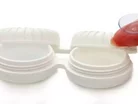Save your contact lenses from a rare parasite

Written by: Heather Ferris
Fears are rising in Scotland and Britain about a little-known eye-eating amoeba that could cause blindness for the millions of people who wear contact lenses.
Discovery of a rare parasite
An alarmist article in the Daily Mail described an extremely rare parasite known as Acanthamoeba keratitis that can stick to contact lenses and eventually gnaw its way through the cornea, causing acute pain. It feeds on bacteria and the corneal tissue.
Scientists at the University of West Scotland originally discovered the parasite Acanthamoeba is abundant in tap water as well as rivers, ponds, lakes and even swimming pools. If contact lens wearers are exposed to this parasite, they could find themselves with painful infections, and even blindness in some cases.
At risk from the parasite are an estimated 3.7 million British and Scottish contact lens wearers, say the scientists, and more than 125 million worldwide. Dr Fiona Henriquez, from the University of the West of Scotland, said "It is a potential problem for every single contact lens wearer. The incidence is quite low but that may be a problem with diagnosis."
Tips to avoid infection
So how can protect yourself against germs, viruses and amoebas that may arise as a result of improperly cleaned or neglected contact lenses? Most eye doctors still advocate cautionary measures to reduce the chance of infection with contact lenses. Some of these measures include the following:
-
Never use tap water to clean contact lenses.
-
Use only quality products such as Acuvue contact lenses, or another quality name brand recommended by doctors.
-
Follow doctor-prescribed instructions on how to care for your lenses.
-
Avoid wearing contact lenses while swimming, showering or using a hot tub. If you use contact lenses to see while swimming, wear water-tight goggles and throw the lenses away afterward.
-
Find a way to use single-use daily contact lenses; they’re more effective against infections than reusable ones.
-
Clean your lenses in multipurpose solution and store them in fresh disinfecting solution.
- Replace your lenses often.
Knowing the right way to keep your contacts lenses clean is the first step toward avoiding infections that can be irritating at first, and if left untreated, life-threatening later on.
Those at risk
Doctors in the UK treat around 75 people infected with the parasite every year, according to Associated Press. However, the U.S. Center for Disease Control conducted a study in 2009 that found occurrences of the infection in the U.S. were very low, at one to two cases per 1 million contact users. Currently, there are 36 million to 40 million contact lens wearers in the U.S., according to a 2008 industry figure from Johnson & Johnson Vision Care. While the numbers are very small, the effects can be devastating for those affected.
Another view on the subject comes from the American Optometric Association (AOA), which studied the parasite and downplayed its ability to infect. The AOA wrote on its site that "Acanthamoeba is one of the most ubiquitous organisms in the environment, but rarely causes infections. When infection does occur, however, it can be extremely serious and vision threatening. Recently, there have been multiple reports of increasing incidence of Acanthamoeba keratitis. Co-infection with a bacterial keratitis is common both in the contact lens case and on the cornea, complicating prevention, diagnosis and treatment."
About Ms. Heather Ferris
Heather Ferris has a degree in English Literature and a passion for coffee and books. She is an avid blogger and a contributing writer to numerous respected health, marketing, community, and travel blogs.
